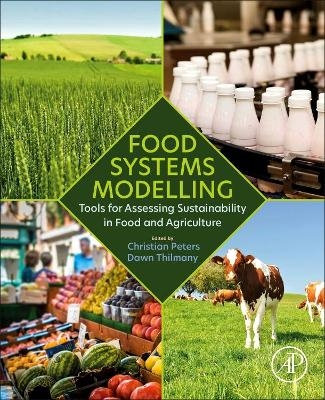
Food Systems Modelling
Academic Press Inc (Verlag)
978-0-12-822112-9 (ISBN)
This book will be a welcomed reference for food scientists, agricultural scientists, nutritionists, environmental scientists, ecologists, economists, those working in agribusiness and food supply chain management, community and public health, and urban and regional planning, as well as academicians and graduate students interested in the sustainability of food systems.
Christian J. Peters is a scientist with the U.S. Department of Agriculture, Agricultural Research Service where he leads the Food Systems Research Unit. Prior to joining USDA in 2021, Dr. Peters served on the faculty of the Friedman School of Nutrition Science and Policy at Tufts University teaching primarily in the Agriculture, Food, and Environment program. His research interests lie in the developing field of sustainability science, in the area of food systems. Within this broad, trans-disciplinary field, Dr. Peters currently focuses on three major topics: (1) Sustainability implications of dietary choices, (2) Land requirements of food consumption and carrying capacity of agricultural land resources, and (3) Production potential of local and regional food systems. Some of Dr. Peters’ most well-known work include spatial analyses of potential local foodsheds and models of the carrying capacity of New York State and the conterminous U.S. Dr. Peters received his Master of Science and Ph.D. degrees in Soil and Crop Sciences from Cornell University and received his Bachelor of Science degree in Environmental Sciences from Rutgers University. Dawn Thilmany is a Professor with Colorado State University, serving in that role since 1997, and specializes in economic development related to local, organic and other value-added food market segments, as well as food market analysis and consumer behavior. She is co-Director for CSU’s Regional Economic Development Institute, is on the leadership team for CSU Extension Food Systems program and has been a visiting scholar at both the USDA National Institute for Food and Agriculture and Economic Research Service. She has chaired the Colorado Food Systems Advisory Council and served on the US Dept of Agriculture’s Advisory Board on Research, Extension, Education and Economics. She has also served in leadership positions with the Agricultural and Applied Economics Association, the Western Agricultural Economics Association, the Food Distribution Research Society and several regional research committees.
1. Introduction – Using models to study food systems
2. The origins, definitions and differences among concepts that underlie food systems modeling
3. Life cycle assessment of foods and diets
4. Water Footprint Assessment: towards water-wise food systems
5. Land use modelling from farm to food systems
6. Foodshed analysis and carrying capacity estimation
7. Market and Supply Chain Models for Analysis of Food Systems
8. Framing and evaluating the economic impacts of food system policies, programs and initiatives
9. Environmental Input-Output (EIO) Models for Food Systems Research: Application and Extensions
10. Modeling biophysical and socioeconomic interactions in food systems with the International Model for Policy Analysis of Agricultural Commodities and Trade (IMPACT)
11. Using Social Network Analysis to Understand and Enhance Local and Regional Food Systems
12. Participatory modeling of the food system: The case of community-based systems dynamics
13. Using models to understand community interventions for improving public health and food systems
14. Applying environmental models in the food business context
15. Inquiry within, between, and beyond disciplines
16. Conclusion: Towards a holistic understanding of food systems
| Erscheinungsdatum | 21.01.2022 |
|---|---|
| Zusatzinfo | Approx. 100 illustrations; Illustrations |
| Verlagsort | San Diego |
| Sprache | englisch |
| Maße | 191 x 235 mm |
| Gewicht | 820 g |
| Themenwelt | Naturwissenschaften ► Biologie ► Ökologie / Naturschutz |
| Weitere Fachgebiete ► Land- / Forstwirtschaft / Fischerei | |
| ISBN-10 | 0-12-822112-7 / 0128221127 |
| ISBN-13 | 978-0-12-822112-9 / 9780128221129 |
| Zustand | Neuware |
| Haben Sie eine Frage zum Produkt? |
aus dem Bereich


